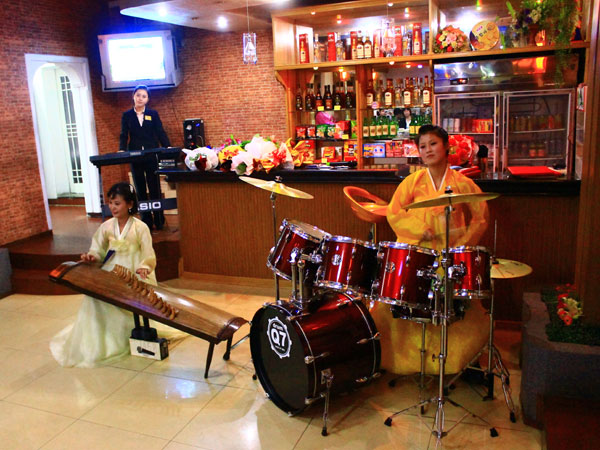 |
|
Women perform traditional music at a restaurant in Pyongyang. KE HAITIAN FOR CHINA DAILY |
| Tourists' tales |
| Under Western Eyes |
Although extremely expensive, cellphones are commonly used in Pyongyang. On one of the platforms at the railway station, I saw a man talking to his child via a video call. Ms Kim told me that a smartphone costs at least 2,000 yuan, and the most popular brands are Huawei, and ZTE, both Chinese, of course.
The general public has little access to the Internet. Instead, university students and the Pyongyang elite use an intranet vetted by the authorities, to go online. The only time I went online in the DPRK was in Sinuiju, where I successfully connected via the mobile network in Dandong.
The wax statue
On the third day, we went to Mount Myohyang, also known as “the Mountain of Mysterious Fragrance”. It’s one of the most beautiful natural landscapes in the Korean Peninsula, and also the location of the International Friendship Exhibition Hall, a huge labyrinthine complex that houses more than 100,000 gifts presented to Kim Il-sung and Kim Jong-il by people from all over the world.
Some members of my tour group were unhappy when they entered the hall that contains a wax statue of Kim Il-sung, because the local guides insisted that we all bowed to the figure. When I saw a local woman crying in front of the statue, I asked Ms Kim, “Why do people cry before the statue?” A look of sorrow crossed her face as she replied, “Many Koreans cry when they come here because the statue resembles our Great Leader so much!”
Food is rationed in the DPRK, and vouchers are issued to ordinary citizens. Ms Kim told me, “Every citizen is given 600 grams of cereal or rice a day. Also, non-staple foodstuffs including cooking oil and eggs are also distributed.” I think she said that these were the “standard” or “recommended” rations, but then I remembered that the Chinese businessman I had met on the train had said his workers receive 300 grams, half the figure quoted by Ms Kim.
Contrary to my mother’s concerns, I ate well in the DPRK and certainly didn’t feel hungry. I gave all the food and fruit I’d brought from China to children when the tour group visited a local school.
A popular DPRK children’s song goes like this: “Our home is the bosom of the party/ We are one big family/ Our Father is Marshal Kim Il-sung/ We have nothing to fear/ Our father will always be with us/ We have nothing to envy in the world.”
Contact the reporter at dongfangyu@chinadaily.com.cn
